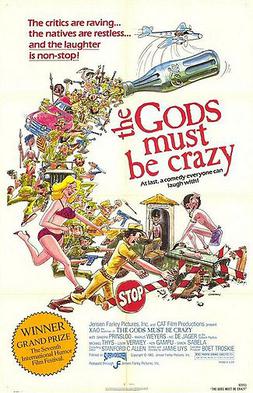The Gods Must Be Crazy
1980 South African comedy film
The Gods Must Be Crazy is a 1980 South African comedy film written and directed by Jamie Uys. The film is the first in The Gods Must Be Crazy series and was followed by The Gods Must Be Crazy II in 1989. The film is set in Botswana and follows the story of a San tribesman named Xi, who encounters modern civilization for the first time.
Plot[edit | edit source]
The film begins with a narrator explaining the life of the San tribe in the Kalahari Desert. The peaceful existence of the tribe is disrupted when a Coca-Cola bottle is thrown from an airplane and lands unbroken in the desert. The tribesmen initially find various uses for the bottle, but it soon becomes a source of conflict. Believing the bottle to be an evil object, Xi decides to take it to the edge of the world and dispose of it.
During his journey, Xi encounters various aspects of modern civilization, including a biologist named Andrew Steyn and a school teacher named Kate Thompson. The film humorously depicts the misunderstandings and cultural clashes that arise from these encounters.
Cast[edit | edit source]
- N!xau as Xi
- Marius Weyers as Andrew Steyn
- Sandra Prinsloo as Kate Thompson
- Louw Verwey as Sam Boga
- Michael Thys as Mpudi
- Nic de Jager as Jack Hind
Production[edit | edit source]
The film was shot primarily in Tsumkwe, Namibia, and various locations in Botswana. The director, Jamie Uys, aimed to create a film that would highlight the simplicity and innocence of the San tribe while providing a comedic critique of modern society.
Reception[edit | edit source]
The Gods Must Be Crazy was a commercial success, grossing over $100 million worldwide. It received positive reviews for its unique storytelling and humorous take on cultural differences. The film has since become a cult classic and is often studied for its portrayal of indigenous cultures and its commentary on modernity.
Legacy[edit | edit source]
The success of The Gods Must Be Crazy led to the production of a sequel, The Gods Must Be Crazy II, and several unofficial sequels. The film remains a significant work in South African cinema and continues to be popular among audiences worldwide.
Related Pages[edit | edit source]
Categories[edit | edit source]
Search WikiMD
Ad.Tired of being Overweight? Try W8MD's physician weight loss program.
Semaglutide (Ozempic / Wegovy and Tirzepatide (Mounjaro / Zepbound) available.
Advertise on WikiMD
|
WikiMD's Wellness Encyclopedia |
| Let Food Be Thy Medicine Medicine Thy Food - Hippocrates |
Translate this page: - East Asian
中文,
日本,
한국어,
South Asian
हिन्दी,
தமிழ்,
తెలుగు,
Urdu,
ಕನ್ನಡ,
Southeast Asian
Indonesian,
Vietnamese,
Thai,
မြန်မာဘာသာ,
বাংলা
European
español,
Deutsch,
français,
Greek,
português do Brasil,
polski,
română,
русский,
Nederlands,
norsk,
svenska,
suomi,
Italian
Middle Eastern & African
عربى,
Turkish,
Persian,
Hebrew,
Afrikaans,
isiZulu,
Kiswahili,
Other
Bulgarian,
Hungarian,
Czech,
Swedish,
മലയാളം,
मराठी,
ਪੰਜਾਬੀ,
ગુજરાતી,
Portuguese,
Ukrainian
Medical Disclaimer: WikiMD is not a substitute for professional medical advice. The information on WikiMD is provided as an information resource only, may be incorrect, outdated or misleading, and is not to be used or relied on for any diagnostic or treatment purposes. Please consult your health care provider before making any healthcare decisions or for guidance about a specific medical condition. WikiMD expressly disclaims responsibility, and shall have no liability, for any damages, loss, injury, or liability whatsoever suffered as a result of your reliance on the information contained in this site. By visiting this site you agree to the foregoing terms and conditions, which may from time to time be changed or supplemented by WikiMD. If you do not agree to the foregoing terms and conditions, you should not enter or use this site. See full disclaimer.
Credits:Most images are courtesy of Wikimedia commons, and templates, categories Wikipedia, licensed under CC BY SA or similar.
Contributors: Prab R. Tumpati, MD

